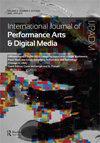构建人类世的混合未来
IF 0.9
0 THEATER
International Journal of Performance Arts and Digital Media
Pub Date : 2023-01-02
DOI:10.1080/14794713.2023.2180342
引用次数: 0
摘要
提出了一种(理论上)将地方性与表现联系起来的重新概念。她的重点是社交虚拟现实,这是一种虚拟现实形式,地理位置分散的观众和表演者在虚拟360°环境中实时进行身体和声音互动,作为使用虚拟现实护目镜的化身。在她对Double Eye Studio Hunter的《寻找潘多拉X》(Finding Pandora X)的分析中,她展示了戏剧作为“公理化的地方性”的主流理解,即戏剧的地理局限性,包括建筑、社会和经济影响,是如何在社交VR环境中扩展和收缩的。《寻找潘多拉X》同时将观众和表演者的身体去本地化,并将个人戏剧体验超本地化到参与者私人住宅中划出的几平方米的有限空间内。E.B.亨特重新定义了戏剧的位置,并由此重新认识了我们所说的戏剧社区的含义。社交VR的参与者从根本上体验到社区是混合的,一方面在身临其境的共享叙事环境中增强了社区感,另一方面由于他们之间的地理距离而保持了分离感。共存空间转变为混合关系。本文章由计算机程序翻译,如有差异,请以英文原文为准。
Framing hybrid futures in the Anthropocene
suggests a (theoretical) reconceptualisation of locality in relation to performance. Her focus lies on social VR, a form of virtual reality in which geographically dispersed audience members and performers interact with each other in a virtual 360° environment – physically and vocally in real time – as avatars using VR goggles. In her analysis of Finding Pandora X by Double Eye Studio Hunter demonstrates how the dominant understanding of theatre as ‘ axiomatically local ’ , that is of a geographical boundedness of theatre including architectural, social and economic implications, is both expanded and contracted in social VR environments. Finding Pandora X simultaneously de-localises audiences and performers corporeal bodies and hyper-localises the individual theatre experience to a limited space of a few square metres marked out in the private homes of the participants. E.B. Hunter recon fi gures the place of theatre and, with it, reconceives what we might mean by a theatrical community. The participants of social VR experience community as fundamentally hybrid, engaging with an increased sense of communitas in an immersively shared narrative environment on the one hand, while retaining a sense of separation due to the geographical distance amongst themselves on the other hand. Co-present spaces turn into hybrid relationalities.
求助全文
通过发布文献求助,成功后即可免费获取论文全文。
去求助
来源期刊

International Journal of Performance Arts and Digital Media
Arts and Humanities-Visual Arts and Performing Arts
CiteScore
1.70
自引率
0.00%
发文量
29
 求助内容:
求助内容: 应助结果提醒方式:
应助结果提醒方式:


